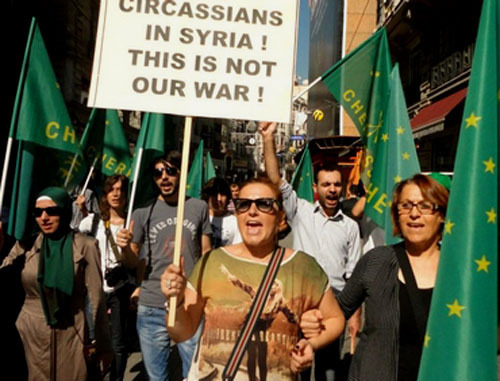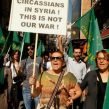
Circassians Organize as Sochi Olympics Approach
Publication: Eurasia Daily Monitor Volume: 10 Issue: 199
By:

On October 31, the parliament of Kabardino-Balkaria approved an appeal to Russian Federation Council chairwoman Valentina Matvienko and State Duma Speaker Sergei Naryshkin to assist in the repatriation of Syrian Circassians to the North Caucasus. “Over 150,000 Circassians live on the Syrian territory,” the appeal read. “They have experienced hardships, such as fleeing their homes. Their natural aspiration to return to their historical homeland is inextricably linked to their concerns for their personal safety and well-being, for maintaining their cultural identity [in Syria].” Thus far, an estimated 1,000 Syrian Circassians have left Syria for the North Caucasus (https://ria.ru/arab_riot/20131031/973944694.html#ixzz2jQRGN5xD).
The Kabardino-Balkarian parliament’s appeal to the Russian parliament is not a trivial step, and required significant nerve on the part of the republican government given Moscow’s annoyance with the Circassian question. Even though Moscow preferred to keep quiet about the Circassian issue or make occasional neutral statements in the run-up to the Winter Olympics in Sochi in 2014, Russian analysts, many of them close to the government, repeatedly attacked the Circassians in a variety of ways. The Russian government is certainly not going to be happy about the Kabardino-Balkarian legislature’s attempt to ask the central government to respond to the plight of the Syrian Circassians. Despite serious pressure from Moscow, republican governments in the Circassian republics are seeking ways to support their ethnic kin. For example, the government in Adygea has set up a special website that helps to establish links between the Syrian Circassian refugees in the republic and their local clan members. An estimated 130 families of Syrian Circassians fled to Adygea after the unraveling of the Syrian crisis (https://ria.ru/society/20131031/973893088.html).
Moscow has signaled that it does not approve of Circassians’ return to the North Caucasus. Apart from stopping the flow of Circassian refugees from Syria, the Russian government also took a more hostile stance toward those refugees that made it into the country. For example, the Circassian civil organization Peryt was fined for helping a group of 19 Syrian Circassians obtain Russian business visas. These people arrived in Russia and then turned to the Russian government for protection as refugees from Syria. The authorities hit Peryt with a whopping $250,000 fine, which would virtually result in its closure. The refugees themselves were fined about $70 each for “lying” on their visa applications. A court in Nalchik decided the case in favor of Peryt, but it is still unclear how the government will respond (https://www.kavkaz-uzel.ru/articles/232464/).
The Sochi Olympics, which will be held on the historical lands of the Circassians, are a landmark event that provides a rallying point for Circassian activists to use to advance their interests. Ruslan Gvashev, the Circassian elder in Krasnodar region, said in an interview with a human rights organization based in Nalchik that Circassians should have the status of people indigenous to the region and be properly represented in the Sochi Olympics program. “They tell us, ‘you will also be represented at the Olympics, dance there, etc.,’ but we are not ‘also’—we are the only people native to this land,” Gvashev said. The activist stated that Circassians expected the Russian government to pay as much attention to the native people of the region as governments paid to the representation of indigenous people in previous Olympics games, such as Winter Games in Vancouver, Canada (https://www.youtube.com/watch?v=wZ4puMrbJSA&feature=share&list=UUGahtd72bcCG-dM3XtDKpvg).
In October, an association of the foreign alumni of the Kabardino-Balkaria State University was established in Nalchik. Last month also saw the launch of an Internet website that tells the story of the Circassians’ deportation to the Ottoman Empire by the Russian government in the 19th century, using historical documents. “The transnational Circassian movement is on the rise” because the democratization of Turkey has allowed that country’s Circassian 5 million-strong diaspora to organize and become an important voice for the Circassians, Circassian activist Andzor Kabard told the Kavkazsky Uzel (Caucasian Knot) website. According to Kabard, Georgia’s recognition of the Circassian “genocide” allowed the Circassian issue to be raised in the international arena, such as United Nations General Assembly, while the war in Syria has made the issue of the Circassians’ repatriation to the North Caucasus ever more pressing and the Sochi Olympics galvanized Circassians worldwide and helped them make their problems known globally. Kabard listed the main problems of the Circassians in the North Caucasus as the lack of the right to unify Circassians in their historical homeland, the degradation of the Circassian language, the de-secularization of Kabardino-Balkaria, the quasi-feudal system of governance in the North Caucasus imposed by Moscow, offensive interpretations of history by Russian historians, and the incitement of inter-ethnic and inter-religious conflicts by state propaganda (https://www.kavkaz-uzel.ru/articles/232398/).
Circassian activists appear to have found an ally—albeit a cautious one—among the republican governments of the Circassian republics in the North Caucasus. At a time when Russian nationalism is so prolific in Russia, other nationalisms are bound to follow the lead, inspired by events in Moscow with the harassment of Central Asian and Caucasian Muslims. Even the ostensibly pro-Moscow elites in the North Caucasian republics are showing support for their ethnic kin, implicitly clashing with Moscow’s interests.




